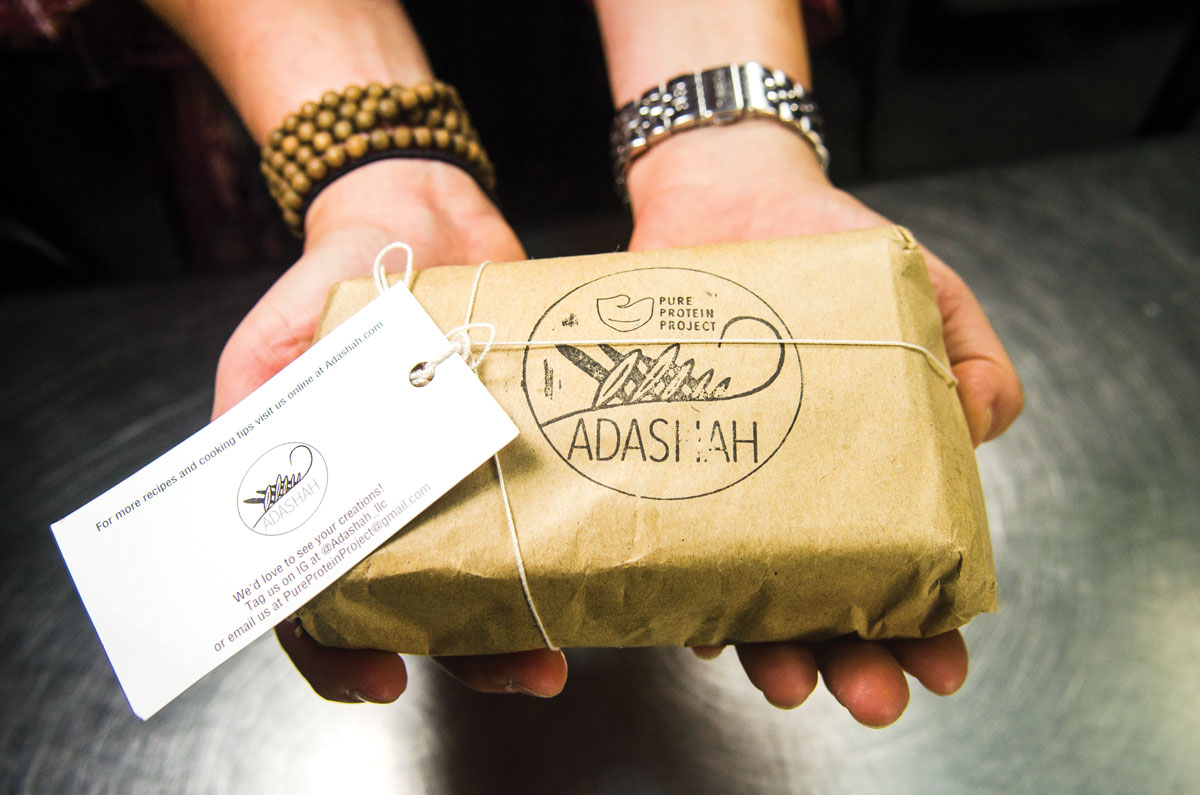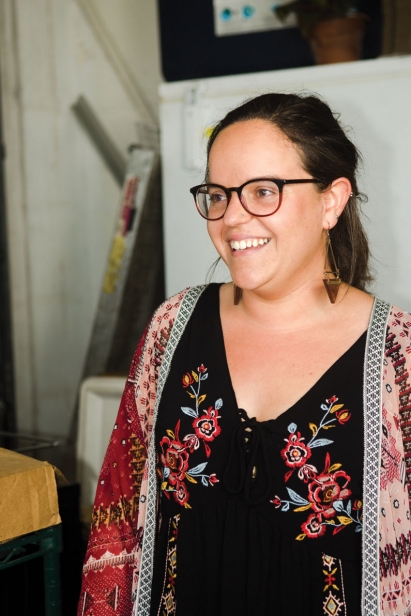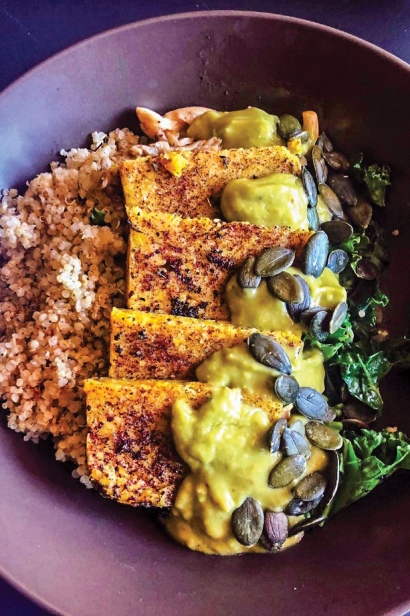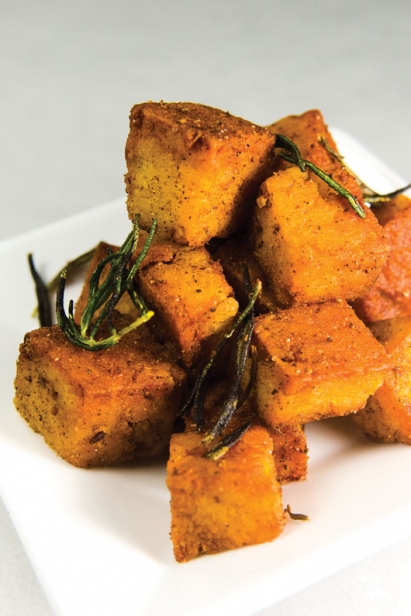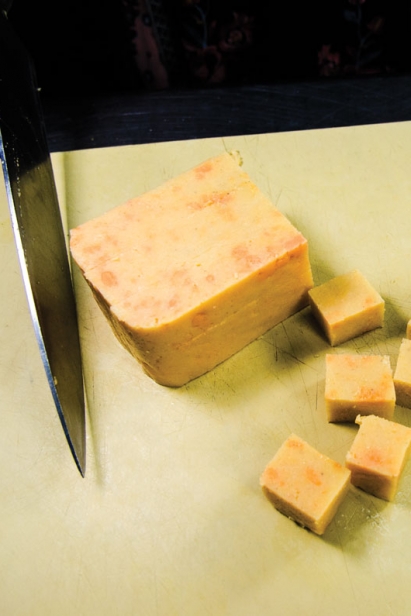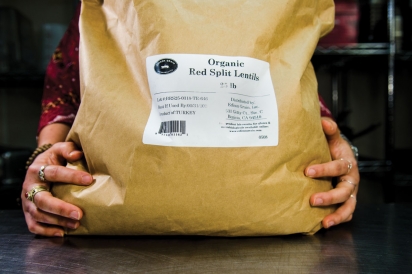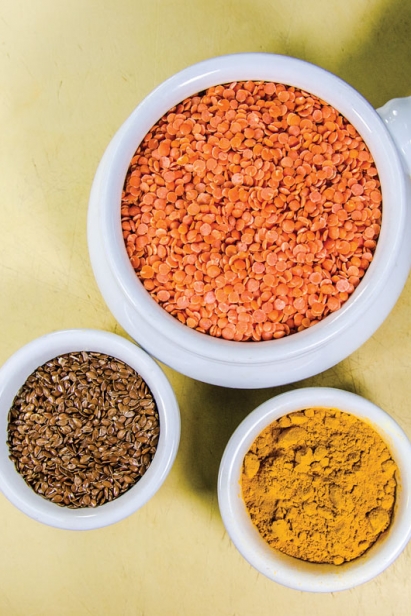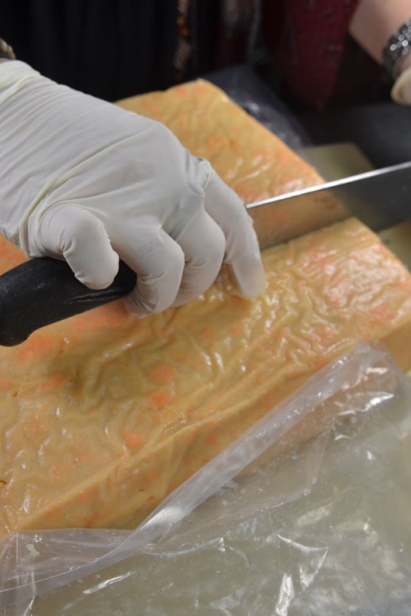Local Woman Makes Food: The Story of Amazing Adashah
When she’s not cooking up her lentil-based protein product, packaging it, making sales and doing deliveries, Taylor Cohen is dreaming about what needs to be done next to build her business.
For Taylor Cohen, 25, recent months have been a blur of working to promote Adashah (AH-dah-shah), the tasty vegan protein that’s been showing up in bowls, wraps, salads, Reubens and Korean BBQ at healthy-eating restaurants in South Florida.
Health Driven
Part of the reason Cohen came up with the product was personal. Diagnosed with colitis as a teenager, the Surfside native was prescribed a diet of white grains and canned produce, hard to swallow when you’ve grown up eating healthy. To relieve symptoms, “sometimes plant-based diets worked,” she says. “Completely clean, no allergens.” Her studies took her to Israel, then Yeshiva University in New York City, plus an apprenticeship at Eden Village Camp in upstate New York, where she learned about cooking, sustainability and food justice. When she returned to Brooklyn to work for Repair the World, she set out to develop a plant protein with no gluten, no soy, no chemicals, no allergens.
“I was living in a tiny apartment filled with pots of soaking lentils and chickpeas and bowls of cooked product,” she says. After trials, she landed on a mixture of red lentils, flaxseed and turmeric, both fresh and powdered, and set out to perfect the formula so that every batch would come out the same.
“I’m looking for crispy on the outside, fluffy on the inside,” she says. The raw product is smooth with a faint nuttiness and a mild flavor that takes on whatever it’s cooked with, ready to be dusted with spices and fried or roasted.
Cohen tested it out on friends – “they liked it, but they didn’t know what I was up to.” She named her product Adashah, Hebrew for lentil, and test-launched it at Plant-Based Bushwick, a vegan food festival. “We sold out two hours early,” she says. “The number-one question was, ‘Where can we get some more?’”
Back Home
Cohen returned to Miami to introduce Adashah to South Florida’s growing vegan community. A family connection led her to Della Heiman, founder of The Wynwood Yard, and the timing was ideal: “Our restaurant was searching desperately for a soy-free, gluten-free, dairy-free alternative to tofu that upheld our standards for clean ingredients,” says Heiman, who tasted Adashah along with colleagues Ken Lyon and Julie Frans. “We were all blown away at first bite, and jumped into action to get the product on our menu.”
At Della Bowls, Adashah – listed as a protein choice along with chickpeas, lentils, black beans and tempeh – allowed them to shift away from highly processed plant-based proteins. “It’s become the most talked about, best-selling item on our menu,” says Heiman. “Our customers love the texture and flavor of the product.” As a launchpad for local culinary entrepreneurs, The Wynwood Yard helps mentor and support them, and Cohen was an ideal candidate, says Heiman. “She’s deeply dedicated to her mission, the hardest of workers, and truly one of the kindest and most community-oriented people I’ve ever met.” In turn, Cohen credits Heiman, Frans, Lyon and others in the South Florida community with helping her navigate issues like insurance and state agriculture regulations for her fledgling business. She also got valuable help from Allison Silverstein, a key mentor with her consulting background.
Getting Adashah on South Florida restaurant menus is only part of Cohen’s efforts. She’s been busy presenting it to the food community. At the 2018 Better Food Movement Conference in Miami, she won the Better Food Innovator Award. She gave a demo at the recent Pulse Innovation Miami conference, impressing organizer and longtime vegan author Ellen Kanner. “In its raw form, you could mistake Adashah for a block of cheddar. It’s pale orange and pleasingly dense, compared to tofu’s floppy quality,” she says. “For the demo, she coated chopped Adashah with a spice mix and gave it a quick turn in a skillet for a nice crust. “She offered a variety of sauces to dunk it in, perfect for nibbling.”
Kanner says she likes to make it part of a meal by dicing it up, adding to a half sheet of chopped vegetables and roasting everything together. “The Adashah comes out full-flavored and al dente, with good chew. Sometimes I toss everything with smoked paprika, coriander and cumin gives it a Middle Eastern flavor. Cumin, chili and lime spins it Mexican. It’s also good with tomato and basil for an Italian accent. But now that I’m thinking of it, Adashah would love to meet sriracha, soy and ginger, or lemon, garlic, sea salt and olive oil. Adashah might even work dipped in chocolate, but I haven’t gone there yet.”
Maria Alemann of vegan food delivery service Artichoke Food says customers like that it’s soy- and gluten-free, and she likes its versatility: “I’ve played with it on Indian to Latin to Italian-style food, and all of them were delicious and rich!” she says.
The young business is poised for growth. Cohen’s team, which includes her brother, Brandon, who handles business, and Leslie Kaplan of Piping Gourmets, meets weekly to work on strategy. The goal is to build the market, learn how to scale the business and get Adashah into grocery stores. Even at this point, Cohen seems amazed at the success of her humble product with restaurant customers and the public. “I have to pinch myself,” she says.
Versatile Adashah
Cohen works in Ken Lyon’s Hialeah commercial kitchen alongside, as it turns out, some other well-known local vegan food businesses, including Atlas Meat-Free Deli, baker Pamela Wasabi and BeCultured Tempeh. Every week, she makes 600 pounds of the plant-based protein and packs it up for delivery to clients.
She gets 25-pound bags of organic red split lentils from the family-owned Edison Grainery, a California company. Red split lentils, which cook faster than whole lentils because their outer skins are removed, are packed with protein and high in fiber, folate and vitamin B1. These come from Turkey and Cohen is trying to find a U.S. organic source for lentils. Other ingredients that make up Adashah include fresh and powered turmeric, the yellow rhizome related to ginger, and flaxseed, high in protein, fiber and B vitamins.
How Cohen cooks and prepares Adashah is her trade secret. When it’s done, the batch of thick yellow and orange-flecked mixture is poured into pans so that it can be cut into slabs that are vacuum packed and refrigerated for delivery. They keep for 3-4 weeks in the refrigerator, something she would like to extend in order to ship out of state. Each restaurant prepares it differently, using it in wraps, bowls, salads, in a vegan bolognese, breakfast burritos, even as a burger.
ADASHAH
adashah.com
The lentil protein is on the menu at Della Test Kitchen at the Wynwood Yard, Pura Vida Cafe in Miami Beach, Plant Theory Botanical Cafe in Miami Beach, The Honey Tree in Miami, Dirt in Miami Beach and Brickell and Delirio Fresh Co. in Miami and Doral. Baptist Health is featuring it at their Kendall campus and Doctors Hospital. Vegan delivery service Artichoke Food also features Adashah.


